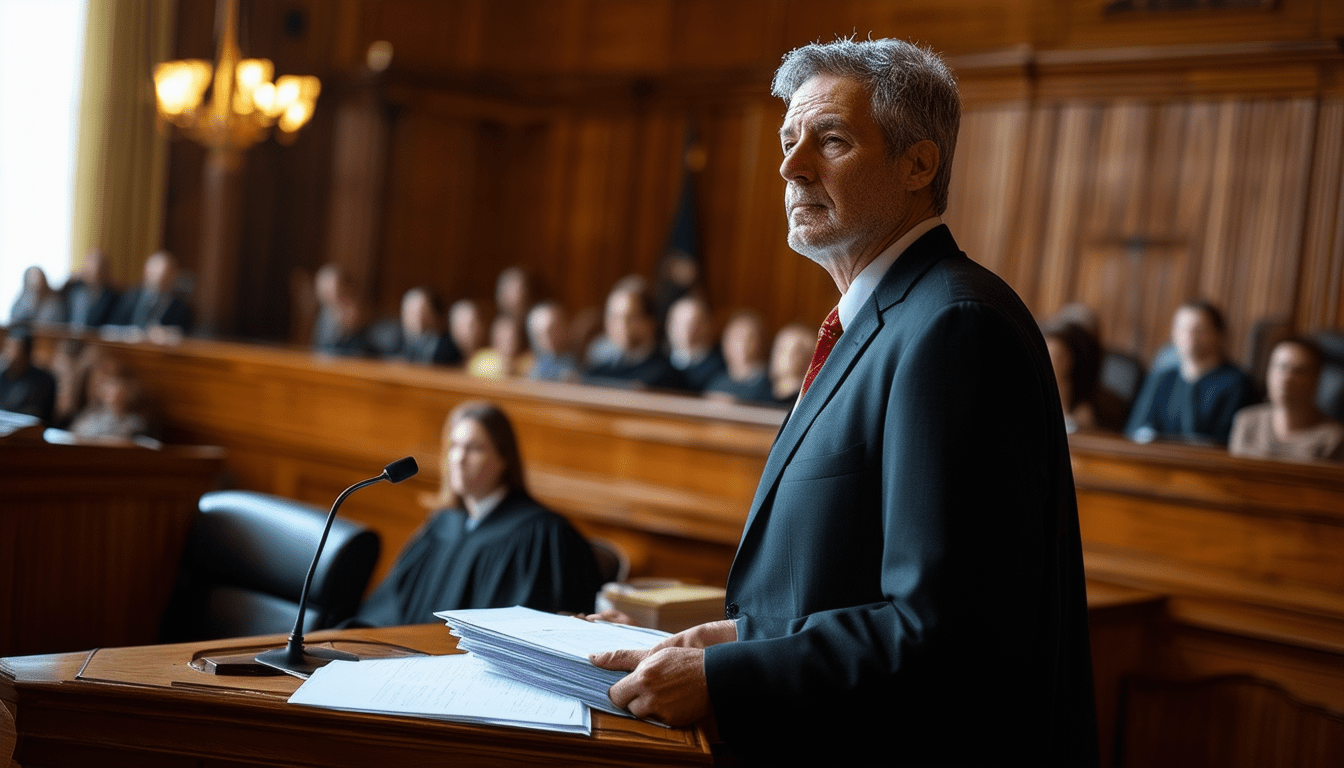Former Massachusetts Marijuana Regulator Seeks Supreme Judicial Court’s Intervention for Reinstatement
|
IN BRIEF
|
The recent controversy surrounding Shannon O’Brien, the former chair of the Cannabis Control Commission (CCC) in Massachusetts, has escalated into a significant legal battle. O’Brien is appealing her dismissal, which she claims is rooted in unfounded allegations of gross misconduct, directly to the Supreme Judicial Court. Her case raises critical questions about the standards for termination within independent regulatory bodies and the implications of political dynamics on the integrity of governance in the flourishing marijuana industry.

The Massachusetts cannabis landscape is in turmoil as former Cannabis Control Commission (CCC) chair, Shannon O’Brien, challenges her termination through the state’s Supreme Judicial Court (SJC). O’Brien’s lawsuit stems from accusations of gross misconduct, which she denies as unfounded and influenced by the biases of Treasurer Deborah Goldberg. This legal battle raises significant questions about the standards of conduct required for officials within state agencies and highlights the broader implications for the state’s marijuana regulatory framework.
Legal Background of the Case
Shannon O’Brien’s legal predicament began when she was initially suspended by Treasurer Deborah Goldberg in September 2023. Nearly a year later, O’Brien was officially dismissed under claims of gross misconduct, stated to involve racially insensitive comments and allegedly intimidating behavior towards former CCC Executive Director Shawn Collins. In response, O’Brien’s legal team filed a petition to have her case heard by the SJC, insisting that the accusations are products of bias rather than tangible misbehavior.
O’Brien’s Defense Strategy
Central to O’Brien’s defense is her assertion that the allegations against her lack a solid foundation. Her lawyer, William Gildea, advocates for O’Brien’s right to publicly clear her name, arguing that she embodies the integrity expected of a public servant. In her petition to the SJC, O’Brien meticulously refutes the claims of misconduct, specifically denying the accusation of using a racially charged term to describe Asian Americans. She insists that her comments were misrepresented and lack malicious intent.
Challenges of Gross Misconduct Definition
A focal point in O’Brien’s lawsuit is whether her behavior can genuinely be categorized as gross misconduct. Historical decisions rendered by the SJC indicate that proving intent is crucial in establishing misconduct. In previous rulings, the threshold for justifying an official’s termination from an independent agency is notably high, indicating that O’Brien’s legal team has a viable argument in contesting the grounds for her dismissal. They argue emphatically that her comments were misinterpreted and devoid of any malicious intent.
The Role of Closed-Door Hearings
Goldberg’s decision to fire O’Brien came after an extended series of closed-door hearings. O’Brien has consistently argued that these proceedings were unfair and lacking in transparency. Following the hearings, O’Brien received a dismissal document described as an “80-page diatribe” filled with what her legal team characterized as one-sided, hyperbolic language, citing excessive adjectives to frame O’Brien’s conduct negatively. This documentation has been submitted to the SJC for review, and its potential disclosure raises further questions about the fairness of the hearing process.
The Broader Implications for Cannabis Regulation
O’Brien’s case could set a critical precedent for future governance and oversight of the cannabis industry in Massachusetts. As the legal saga unfolds, it highlights the vulnerabilities within the regulatory framework and the necessity for clear standards governing the behavior of appointed officials. The implications of O’Brien’s case also resonate within the wider context of cannabis regulation across the nation, particularly in states grappling with the balance between accountability and freedom of speech in an evolving industry.
Potential Outcomes of the Supreme Judicial Court’s Decision
The decision rendered by the SJC will likely determine not only O’Brien’s future but also influence the standards of conduct expected from regulators within the rapidly expanding cannabis sector. Should the court decide in favor of O’Brien, it could lead to her reinstatement and potentially reshape the oversight mechanisms governing state cannabis agencies. Conversely, a ruling against her could affirm the current disciplinary processes and the legitimacy of the accusations that led to her termination.
Moreover, the case may invigorate ongoing discussions about the need for reform in the political and regulatory structures related to cannabis in Massachusetts. As stakeholders watch closely, the implications of this lawsuit could reverberate through the state’s approach toward marijuana policy and enforcement, laying groundwork for future reforms.
Comparison of Arguments in Shannon O’Brien’s Case
| Aspect | Details |
| Reason for Dismissal | Accused of gross misconduct and inability to fulfill duties |
| Key Accusations | Racially insensitive comments and bullying of former director |
| Response to Accusations | Denies intent; claims comments were misinterpreted |
| Legal Action | Filed petition with the Supreme Judicial Court for reinstatement |
| Supporting Arguments | Claims the dismissal is a serious miscarriage of justice |
| Decision Maker | Treasurer Deborah Goldberg’s authority questioned |
| Outcome of Hearings | Held in closed doors; deemed unfair by O’Brien |
| Nature of Allegations | Focuses on subjective interpretations of comments |
| Public Reaction | Concerns raised about transparency and fairness in the process |

In a significant development in Massachusetts’s cannabis regulatory landscape, former chair of the Cannabis Control Commission (CCC), Shannon O’Brien, is appealing her dismissal to the state’s Supreme Judicial Court. O’Brien contends that her termination was not only unjust but also a product of unfounded allegations propelled by personal bias from Treasurer Deborah Goldberg.
Context of the Dismissal
Shannon O’Brien was suspended in September 2023 and subsequently fired in September 2024 for what was classified as gross misconduct. The reasons cited for her termination included accusations of making racially insensitive comments and alleged bullying behavior towards former executive director Shawn Collins. These allegations have drawn considerable attention and have sparked a debate regarding the threshold of misconduct justifying removal from such an influential role.
Legal Proceedings Initiated
Seeking to restore her position, O’Brien has filed a petition with the Supreme Judicial Court, requesting that the court hear her case. Her legal representation, led by attorney William Gildea, argues that the case against O’Brien is fundamentally rooted in speculation and personal animosity. Gildea insists that she should have the opportunity to publicly defend her reputation, which he describes as an “honest” reflection of her service.
Challenging the Accusations
O’Brien’s petition meticulously addresses the complaints against her, notably the claim that she referred to Asian Americans using the term “yellow”. She asserts that she was merely quoting an African-American developer, thus claiming no intent of racial insensitivity. Furthermore, O’Brien confronts another unreported complaint that she allegedly made an offensive remark regarding the educational status of her colleagues.
The Question of “Gross Misconduct”
Key to the upcoming legal challenge is whether O’Brien’s actions meet the legal standard of “gross misconduct”. Previous decisions from the SJC have established a high bar for dismissals from independent agency positions. O’Brien’s team maintains that her statements were devoid of malicious intent, raising questions about the appropriateness of her removal under the circumstances.
Implications for Cannabis Regulation
O’Brien’s case has broader implications for the future of cannabis regulation in Massachusetts. As legal precedents are set, they will inevitably influence how future cases are handled, especially regarding discretionary dismissals in autonomous agencies. Stakeholders in the cannabis industry are closely watching this unfolding matter, which will shape the landscape of cannabis governance.
Next Steps in the Legal Battle
The attorney general’s office is representing Goldberg in this ongoing battle. As the case unfolds, attention will turn to the specific details of Goldberg’s rationale for O’Brien’s dismissal, particularly the 80-page document described by O’Brien as hyperbolic and one-sided. The outcome of this case could redefine expectations for conduct and accountability within the CCC moving forward.
- Litigation: Shannon O’Brien appeals her dismissal from the CCC.
- Allegations: Accusations of gross misconduct and racial insensitivity.
- Legal Action: Petition filed with the Supreme Judicial Court (SJC) for reinstatement.
- Public Image: O’Brien emphasizes her reputation as an honest public servant.
- Response: O’Brien’s attorney argues the charges are based on speculation.
- Hearings: Four closed-door sessions criticized as unfair by O’Brien.
- Defense: O’Brien denies malicious intent behind her comments.
- Documentation: Controversial 80-page document submitted as part of the case.
- Outcome Appeal: Potential implications for governance in cannabis regulation.
Overview of the Case
The case of Shannon O’Brien, the former chair of the Massachusetts Cannabis Control Commission (CCC), has garnered significant attention as she seeks legal recourse following her termination. O’Brien was dismissed by Treasurer Deborah Goldberg on allegations of gross misconduct and her inability to fulfill her responsibilities within the commission. Her appeal to the Supreme Judicial Court challenges the validity of these accusations, claiming they are based on unfounded personal biases rather than actual misconduct. This situation raises critical questions about governance, accountability, and the legal standards surrounding the dismissal of public officials in independent agencies.
The Importance of Fair Hearing Processes
Central to the controversy is the process by which O’Brien was removed from her position. It is essential for any public servant facing allegations to undergo a fair and transparent hearing process. In O’Brien’s case, the closed-door hearings raised concerns about transparency and due process. The fact that she contested the fairness of these proceedings highlights the need for stringent protocols that protect the rights of individuals in similar situations. The public deserves assurance that government actions are grounded in fairness and justice.
Legal Standards for Gross Misconduct
O’Brien’s legal team argues that the standard for gross misconduct has not been met in her case. Historically, the Supreme Judicial Court has set a high bar for what qualifies as gross misconduct, often requiring intent and a clear breach of conduct. O’Brien’s defense claims that her actions did not demonstrate any malicious intent and that the comments attributed to her were mischaracterized. This raises critical implications for how misconduct cases are assessed in future governmental settings. Establishing consistent legal standards is paramount in ensuring fair treatment of public officials.
The Role of Bias in Public Office Termination
The allegations that the charges against O’Brien stem from the treasurer’s personal disdain introduces a troubling element into public office dynamics. If political bias can influence the termination of a public official, it undermines the integrity of public service. O’Brien’s assertion that her dismissal was motivated by personal biases rather than substantiated claims of misconduct needs serious consideration. A robust framework should be developed to guard against bias in governance, including the establishment of clear grievance procedures and oversight mechanisms.
Implications for the Cannabis Industry
The outcome of this case holds significant implications for the Massachusetts cannabis industry. The leadership of the CCC directly impacts regulatory policies, compliance, and the growth of the legal cannabis market. A high-profile case like O’Brien’s could influence the operational stability and public perception of the cannabis regulatory framework. If reinstated, O’Brien could potentially bring a renewed focus on professionalism and accountability to the commission, which is crucial in navigating the evolving landscape of cannabis regulation.
As the Supreme Judicial Court considers O’Brien’s appeal, stakeholders across Massachusetts will be watching closely. The case epitomizes the intricate balance needed between personal judgment and professional accountability in public service. Ensuring that processes are equitable, evidence-based, and free from bias is not only critical for the individuals involved but essential for maintaining public trust in governmental institutions.
Frequently Asked Questions
What is the reason for Shannon O’Brien’s appeal to the Supreme Judicial Court? Shannon O’Brien is appealing her termination from the Cannabis Control Commission (CCC), arguing that the allegations of gross misconduct against her are based on speculation and personal dislike by Treasurer Deborah Goldberg.
Who did Shannon O’Brien file her petition against? O’Brien filed her petition against Treasurer Deborah Goldberg, who was responsible for her removal from the commission.
What allegations were made against Shannon O’Brien? O’Brien was accused of making racially insensitive comments and bullying the former executive director of the commission, Shawn Collins.
What specific comments did O’Brien reportedly make? O’Brien reportedly used the term “yellow” to refer to Asian Americans and questioned the articulation of individuals who may not have college degrees.
What did O’Brien’s lawyer state regarding her situation? O’Brien’s lawyer emphasized that she deserves the chance to clear her name and described her removal as a miscarriage of justice against an honest public servant with a strong reputation.
How did Treasurer Goldberg justify the firing of O’Brien? Goldberg justified the firing after conducting four closed-door hearings, which O’Brien has described as unfair, ultimately leading to a decision she claims was based on one-sided and exaggerated characterizations of her conduct.
What has been the response from O’Brien regarding the accusations? O’Brien has repeatedly argued that she had no malicious intent in her comments and decisions, maintaining that many of the accusations against her lack basis in fact.
What does O’Brien’s petition suggest about the standard for gross misconduct? The petition argues that previous decisions by the Supreme Judicial Court indicate a high standard for defining “gross misconduct,” which O’Brien believes her behaviors do not meet.





Post Comment